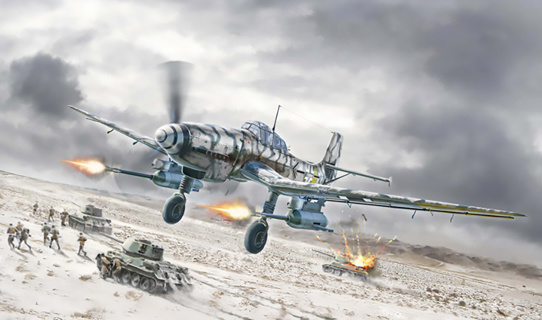JU-87G-2 Kanonenvogel
Item No. 1466
SUPER DECALS SHEET FOR 4 VERSIONS - COLOR INSTRUCTION SHEET FIGURE NOT INCLUDED - CONTAINS 1 MODEL The JU-87 dive bomber is certainly one of the best known aircraft of WW2. The characteristic "gull wing” aircraft gained great notoriety at the beginning of the war, and is considered, together with th
Description
SUPER DECALS SHEET FOR 4 VERSIONS - COLOR INSTRUCTION SHEET
FIGURE NOT INCLUDED - CONTAINS 1 MODEL
The JU-87 dive bomber is certainly one of the best known aircraft of WW2. The characteristic "gull wing” aircraft gained great notoriety at the beginning of the war, and is considered, together with the Panzer Divisions of the Wehrmacht, as defining symbols of the Blitzkrieg. During the war, new versions with differing operational profiles were introduced. The Ju-87G was developed as an "anti-tank" version of the Stuka, to counter the vast array of enemy armored vehicles deployed on the eastern front post 1943.The Stuka “ace” Hans Ulrich Rudel proposed the addition of two 37 mm Flak 18 cannons housed in underwing pods to better counter this developing threat. With this configuration the Ju-87G "Kanonenvogel" proved extremely effective in the hands of experienced pilots. Even more refined was the G-2 version which was characterized by greater wing surfaces, in turn derived from the previous D-5 version.
FIGURE NOT INCLUDED - CONTAINS 1 MODEL
The JU-87 dive bomber is certainly one of the best known aircraft of WW2. The characteristic "gull wing” aircraft gained great notoriety at the beginning of the war, and is considered, together with the Panzer Divisions of the Wehrmacht, as defining symbols of the Blitzkrieg. During the war, new versions with differing operational profiles were introduced. The Ju-87G was developed as an "anti-tank" version of the Stuka, to counter the vast array of enemy armored vehicles deployed on the eastern front post 1943.The Stuka “ace” Hans Ulrich Rudel proposed the addition of two 37 mm Flak 18 cannons housed in underwing pods to better counter this developing threat. With this configuration the Ju-87G "Kanonenvogel" proved extremely effective in the hands of experienced pilots. Even more refined was the G-2 version which was characterized by greater wing surfaces, in turn derived from the previous D-5 version.
JU-87G-2 Kanonenvogel
Item No. 1466
SUPER DECALS SHEET FOR 4 VERSIONS - COLOR INSTRUCTION SHEET FIGURE NOT INCLUDED - CONTAINS 1 MODEL The JU-87 dive bomber is certainly one of the best known aircraft of WW2. The characteristic "gull wing” aircraft gained great notoriety at the beginning of the war, and is considered, together with th
Description
SUPER DECALS SHEET FOR 4 VERSIONS - COLOR INSTRUCTION SHEET
FIGURE NOT INCLUDED - CONTAINS 1 MODEL
The JU-87 dive bomber is certainly one of the best known aircraft of WW2. The characteristic "gull wing” aircraft gained great notoriety at the beginning of the war, and is considered, together with the Panzer Divisions of the Wehrmacht, as defining symbols of the Blitzkrieg. During the war, new versions with differing operational profiles were introduced. The Ju-87G was developed as an "anti-tank" version of the Stuka, to counter the vast array of enemy armored vehicles deployed on the eastern front post 1943.The Stuka “ace” Hans Ulrich Rudel proposed the addition of two 37 mm Flak 18 cannons housed in underwing pods to better counter this developing threat. With this configuration the Ju-87G "Kanonenvogel" proved extremely effective in the hands of experienced pilots. Even more refined was the G-2 version which was characterized by greater wing surfaces, in turn derived from the previous D-5 version.
FIGURE NOT INCLUDED - CONTAINS 1 MODEL
The JU-87 dive bomber is certainly one of the best known aircraft of WW2. The characteristic "gull wing” aircraft gained great notoriety at the beginning of the war, and is considered, together with the Panzer Divisions of the Wehrmacht, as defining symbols of the Blitzkrieg. During the war, new versions with differing operational profiles were introduced. The Ju-87G was developed as an "anti-tank" version of the Stuka, to counter the vast array of enemy armored vehicles deployed on the eastern front post 1943.The Stuka “ace” Hans Ulrich Rudel proposed the addition of two 37 mm Flak 18 cannons housed in underwing pods to better counter this developing threat. With this configuration the Ju-87G "Kanonenvogel" proved extremely effective in the hands of experienced pilots. Even more refined was the G-2 version which was characterized by greater wing surfaces, in turn derived from the previous D-5 version.

